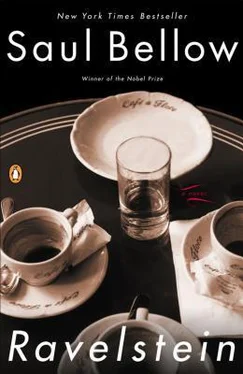He might have been musing over matter, over the physical management of life, the innumerable ways there were to be damaged, wounded, even killed-an unusual line of thought for him. A nurse had suddenly appeared and the mechanic (a technician from the hospital) stood by as her backup. Ravelstein was swung over the side of the bed and lowered, very slowly, into the wheelchair. Dr. Schley's aim was to get Abe on his feet to rebuild his muscles. The long, long legs had no calves and on the white inner arms you could see the veins. You couldn't help but think of the contaminated blood in them. While the nurse tried to cover his genitals, he seemed to be musing over a pressing question-perhaps whether it made sense to struggle so hard for existence. It didn't, but he struggled nevertheless. He gripped the steel, which was probably very cold, the two fists were close to his big ears, near the occipital hair that stuck out, below the bald line. There are bald heads that proclaim their strength. Ravelstein's head had been like that. But now it had become the vulnerable kind. I believe he knew what a picture he made, "piped over the side" in a naval sort of rig, wide open to terror-to ridiculous hysteria. By now, however, he was detached from his triangle and already sitting in the wheelchair; the triangle slipped out from under him, and Nikki took him on a tour of the flat. Rosamund and I followed from room to room.
Nothing had been disturbed. Maintaining the apartment were the two ladies-the Polish woman Wadja, who did the real cleaning on Tuesdays, and black Mrs. Ruby Tyson (far too old for real work), who let herself in on Fridays. Mrs. Tyson's function was to keep up the dignity of the households where she worked. To Wadja, Ravelstein was just another loud Jew-her savage imagination had pictured the money he controlled, and he was rowdy, incomprehensible. Ruby understood him better: he was a professor, a mysterious white personage. As nearly as any honky could, he took into account her problems with her prostitute daughter, her jailed criminal son, and with the other son whose HIV troubles and scrambled wives and children were too complicated to describe. On quiet afternoons he, Ravelstein, would sometimes listen, sympathetic, half dreaming, to Ruby Tyson s stories-really beyond his reach or interests. The old woman presented herself as quiet, dignified, and sadly reserved. You can imagine how Ravelstein would have listened; the chaos the life of such people must be. This good old woman had learned the white game from the deans, provosts, and other academic bureaucrats whose beds she made, and whose parlors she dusted. And, of course, their family problems, the esoteric, psychiatric secrets of their wives, she would tell Ravelstein by the hour. In his apartment she did nothing; most of the time for which he was charged she sat on a bar stool in the kitchen. Now and then she climbed down and baked a pie. The stout, strong, aggressive Wadja attended to the scrubbing and scouring. It was Wadja who moved the furniture, cleaned the toilets, ran the vacuum, scoured the pots, washed the crystal. Easily overheated, she took off her dress and her slip. She worked in a giant bra and swelling Zouave bloomers.
At the sight of him in the wheelchair Wadja's face was torn between compassion and irony-a cocked eyebrow. A mass of suspended comment slid down the pug-nosed slope of her face. Well, it was very bad! But then, he was a Jew as well. You sometimes heard her muttering "Moishala" as she wiped or polished objects. Feeble in the earliest days, Ravelstein greeted her with a lifted forefinger, saying to Nikki, "For God's sake, keep her away from the Lalique."
"She swishes the wine glasses under the tap," Ravelstein said to me. "She chips them on the faucet. I showed her the damage. She started to weep. She said she'd buy me new glasses from Woolworth's. I said, 'You know what those Lalique glasses cost?' When I named a figure, she grinned. She said, 'You jokum, Mister.'"
"You told her the price?"
"You can't help thinking these women are just as rough with men's penises," he would say. "Just imagine-if they were glass."
A certain amount of documentation might be offered at this point to show what I was to Ravelstein and Ravelstein to me. This was never altogether clear to either of us-the principals. Ravel stein would have seen no point in talking around this. He said he was more than satisfied that I could follow perfectly well everything that was said. When he was sick, we saw each other daily and we also had long telephone conversations as close friends should. We were close friends-what else needs to be added? In my desk drawers I find folders containing pages and pages about Ravelstein. But these data only seem to go into the subject. There are no acceptable modern terms for the discussion of friendship or other higher forms of interdependence. Man is a creature who has something to say about everything under the sun.
Ravelstein was willing to lay it all out for me. Now why did he bother to tell me such things, this large Jewish man from Dayton, Ohio? Because it very urgently needed to be said. He was HIV-positive, he was dying of complications from it. Weakened, he became the host of an endless list of infections. Still he insisted on telling me over and over again what love was-the neediness, the awareness of incompleteness, the longing for wholeness, and how the pains of Eros were joined to the most ecstatic pleasures.
This is as good a moment as I will ever find to recall that, from my side, I was free to confess to Ravelstein what I couldn't tell anyone else, to describe my weaknesses, my corrupt shameful secrets, and the cover-ups that drain your strength. As often as not he thought my confessions were wildly funny. Funniest of all were the thought-murders. Perhaps I gave them a comic twist, unwittingly. Anyway, he thought they were uproarious and he said, "Did you ever read Dr. Theodore Reik, the famous Kraut psychoanalyst? He said a thought-murder a day keeps the psychiatrist away."
That I was hard on myself, Ravelstein took, however, to be a favorable sign. Self-knowledge called for severity, and I was always willing to go to the mat with that protean monster, the self, so there was hope for me. But I would have liked to go further. My feeling was that you couldn't be known thoroughly unless you found a way to communicate certain "incommunicables"-your private meta physics. My way of approaching this was that before you were born you had never seen the life of this world. To grasp this mystery, the world, was the occult challenge. You came into a fully developed and articulated reality from nowhere, from nonbeing or primal oblivion. You had never seen life before. In the interval of light between the darkness in which you awaited first birth and then the darkness of death that would receive you, you must make what you could of reality, which was in a state of highly advanced development. I had waited for millennia to see this. Then when I had learned to walk-in the kitchen-I was sent down into the street to inspect it more closely. One of my first impressions was of the huge utility-pole timbers that lined the street. They were beaver-colored, soft and rotted. On their crosspieces or multiple arms they carried many wires or cables in an endless falling relay, soaring, falling again and soaring. On the fixed sag and flow of the cables the spar rows sat, flew off, came back to rest. Along the sidewalks, the faded bricks revealed their original red at sunset. You rarely saw an auto mobile in those days. What you saw were hansom cabs, ice wagons, beer drays, and the huge horses that pulled them. I knew people by their faces-red, white, wrinkled, spotted, or smooth; smiling or violent or furious-their eyes, mouths, noses, voices, feet, and gestures. How they bent down to amuse or question or tease or affectionately torment a small boy.
Читать дальше












